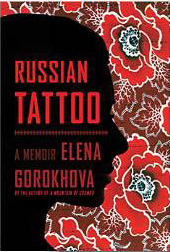
There is no need for me to review Russian Tattoo because everyone else has. Just check Elena Gorokhova’s author page www.elenagorokhova.com Even legendary actors Alan Alda and F. Murray Abraham marched on her behalf.
I have my own passionate response to Russian Tattoo -- a potential blog title: “What color is my envy?” You see, envy can be white or black in Russian. So definitely “white” envy, the good kind. However, I covet her publicity, her publishing house and her fame. She also has a nice cover designer but so did we. Envy aside, our book was meant to inform and help our readers feel what it was like to grow up Jewish in the last half of the twentieth century in the USSR, and to follow the unusual choices of two very gutsy heroines – Vera and Alla. So Alan and F. Murray and all you Russo/bibliophiles, get your own Jewish Luck.
Why am I writing this pseudo-review? It is February 1, 2015 and my sister, Meryll, believes the first of the month signals the dawn of international expectations of a new book review on our webpage. I do my best to break every rule that Meryll establishes; but, in this case, I just whined a lot and followed her lead because older sisters are scary, but often right! That’s another blog.
Elena, my dear Facebook friend, is a lyrical writer. See our review of A Mountain of Crumbs, her memoir of growing up in Leningrad in the same neighborhood as our heroine Alla (aka Alisa) and going to the same English language school. However, Elena’s family culture is very different. Since she is Russian, she is an insider compared to Vera and Alla, outsiders by virtue of being Jewish. In fact, she refers to her mother as the embodiment of Soviet Mother Russia. Her Mom’s pragmatic attitude toward the government system contrasts with that of Vera and Alla’s fathers, who ensure that their daughters understand the lies they are being told, but instruct them on how to play the game. Vranyo (deception) does not seem to be a household world in Elena’s Leningrad apartment.
Like A Mountain of Crumbs, Elena records an intimate story in Russian Tattoo, this time of her struggles with acclimating to life in the US. Like Alla, she was a rebel in her family, searching for freedom of expression and immigrated through a “marriage”. Later, they both felt responsible for getting their families out of a country where there was no longer enough food or adequate health care. Their stories are parallel in many ways though Alla’s new life is set in Sweden. Elena details the loneliness and isolation during her first years in the States trying to find her place in an alien society. Like Alla, she is driven and succeeds.
Russian Tattoo becomes most poignant as Elena describes the tension in her strained relationships both with her aging mother, whom she brings to the US, and her teenage daughter. Her mother, living with Elena, tiptoes through the house trying not to trespass in Elena’s life. There is a generational divide between this survivor of World War II and her daughter. Elena finds herself in her mother’s position as “old country” in relation to her own American born daughter, who meets her mother’s inquiries with hostility. It is touching that Grandmother and daughter connect deeply on their own.
One can easily forget that Elena Gorokhova is writing in a second language. The story is highly personal without a lot of historical context. If you want the historical context and to read about the life she ran from, you could read her first book, A Mountain of Crumbs, but best to read our book, Jewish Luck, first.
And that is how I wish every review of Russian Tattoo would begin and end.